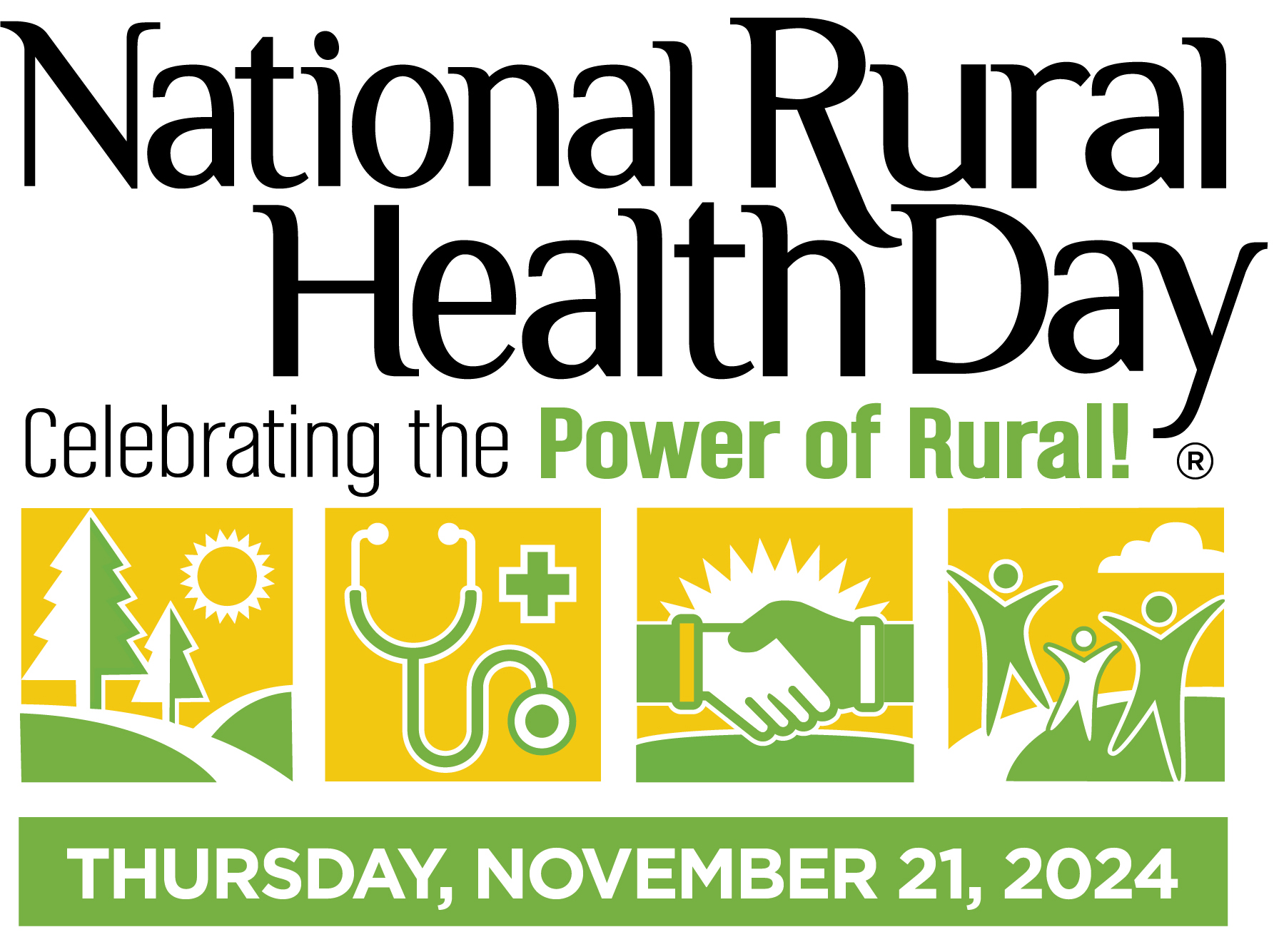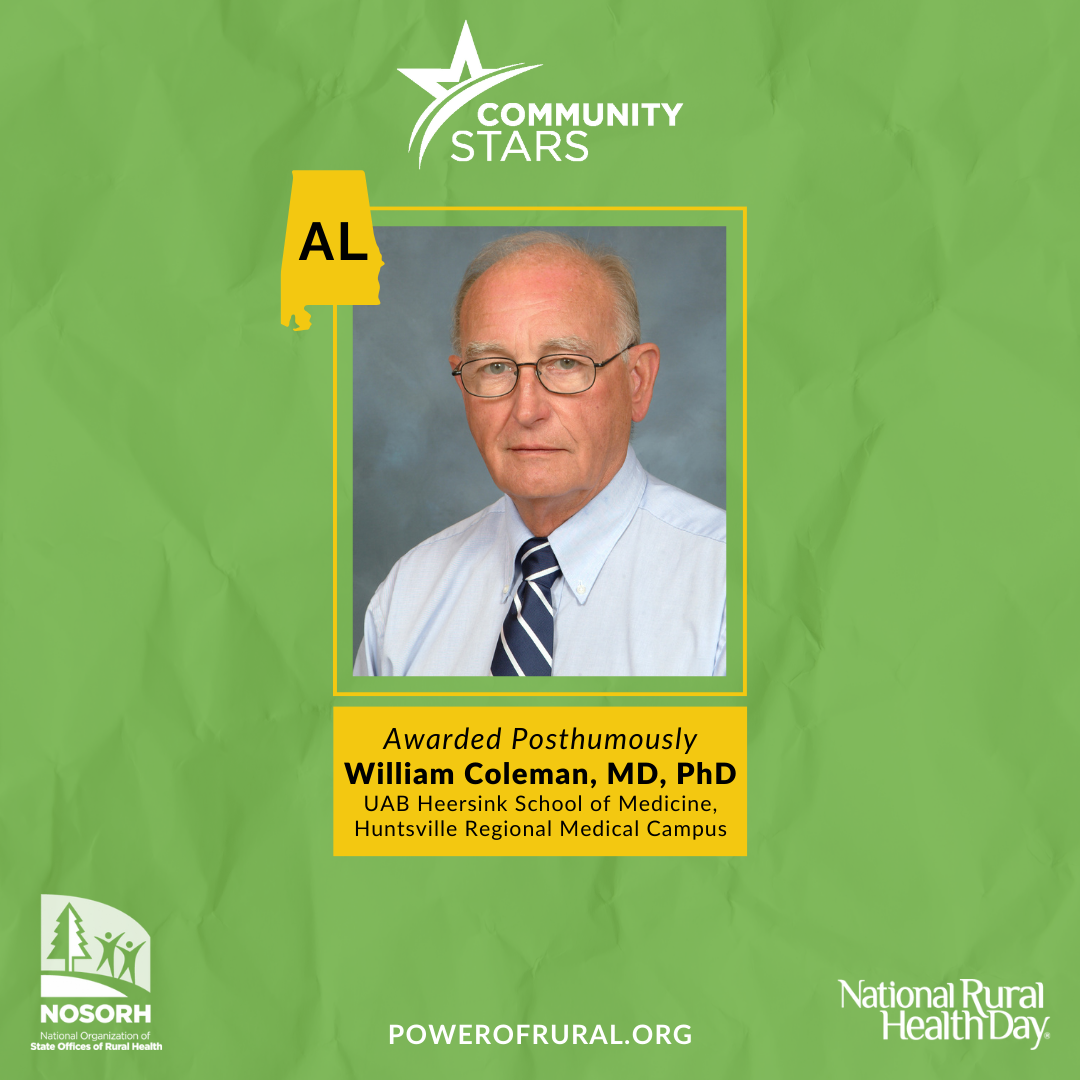- Rural Health Home
- News and Events
- National Rural Health Day
- Conferences/Workshops
- Alabama Flex Grant Program
- Alabama Rural Medical Service Award (ARMSA)
- At A Glance
- Grant Opportunities
- National Health Service Corps
- Health Data
- J-1 Visa Program
- National Interest Waiver Program
- Personnel
- Recruitment/Retention
- Resources
- Rural Health Webinars
- SHIP Program
- Shortage Area Designations
- Telehealth Resources
- Contact Us
National Rural Health Day
 National Rural Health Day is an opportunity to "celebrate the power of rural" by honoring the selfless, community-minded, "can do" spirit that prevails in rural America. The national organization of state offices of rural health sets aside the third Thursday of each November to celebrate National Rural Health Day. This day gives us a chance to bring to light the unique healthcare challenges that rural citizens face and showcase the efforts made by rural healthcare providers and stakeholders to address those challenges.
National Rural Health Day is an opportunity to "celebrate the power of rural" by honoring the selfless, community-minded, "can do" spirit that prevails in rural America. The national organization of state offices of rural health sets aside the third Thursday of each November to celebrate National Rural Health Day. This day gives us a chance to bring to light the unique healthcare challenges that rural citizens face and showcase the efforts made by rural healthcare providers and stakeholders to address those challenges.
Governor Kay Ivey's Proclamation naming November 17, 2022 as Rural Health Day in Alabama
Community Stars
In celebration of National Rural Health Day, the National Organization of State Offices of Rural Health (NOSORH) proudly unveils the 2023 Community Stars! This annual Recognition Program honors remarkable individuals and organizations going above and beyond for rural health. They exemplify the true spirit of collaboration, turning challenges into opportunities, ensuring access to quality care, and fostering a sense of unity and support within our rural communities.
2023 Community Star
 William "Bill" Coleman, MD, PhD (late)
William "Bill" Coleman, MD, PhD (late)
Director, Office for Family Health Education & Research
UAB Heersink School of Medicine, Huntsville Regional Medical Campus
Huntsville, Alabama
Organization/project websites:
What was Dr. Coleman's role within his organization and the nature of his work in rural health?
Dr. Coleman was born and raised in a rural Alabama community (Jemison, pop. 1,000 at the time) and practiced family medicine in the Scottsboro, Alabama community (population 15,000). He lived for 83 years and never called anyplace but Alabama home. He became highly educated, with an MD and PhD; traveled the world pursuing his anatomy PhD research; became national president of the American Academy of Family Physicians; and served on advisory committees for the White House and Harvard University. But what Dr. Coleman was most personally proud of was when a medical school dean pronounced Dr. Coleman as a true "servant leader." To Dr. Coleman, that meant his first and foremost desire as a physician was to serve his patients and his community. In a rural community, he recognized that it was the nature of his profession to support the community in any way he could, just as he relied on the community to support him as the village that helped raise his children and supported his family.
Dr. Coleman established the Office for Family Health Education & Research (OFHER) at the UAB Heersink School of Medicine. The office supports rural medicine efforts with two main projects:
- The Physician Workforce initiative assesses community-by-community need for primary care physicians in rural Alabama. These assessments have recently expanded to nurse practitioners, dentists and psychiatrists. This work made Alabama the first state to completely map Rational Service Areas (RSA) as defined by HRSA.
- The Rural Medicine Program (RMP) admits medical students from rural Alabama with a unique curriculum to educate them on rural healthcare needs and reinforce the role of primary care physicians in rural communities. To date, about 42% of the RMP graduates have become rural Alabama physicians compared to a nationwide average of about 10% of physicians practicing rural medicine. Of the RMP graduates who practice in Alabama, 63% teach rural medical students in their clinics.
Describe a specific project and its successful outcomes or a time when collaboration or innovation was crucial.
A successful and collaborative project OFHER performs annually is the administration of the Alabama Rural Medical Service Award (ARMSA) in conjunction with the Alabama Department of Public Health's Office of Primary Care and Rural Health. ARMSA exists to place primary care physicians and family medicine nurse practitioners in medically underserved areas of the state through financial incentives in the form of service loans. This project and collaboration were successful, as fourteen physicians and nurse practitioners were awarded $640,000 to practice in medically underserved areas in FY 2023.
Describe challenges the organization encountered and how they were overcome.
A primary challenge in the early years was sustained funding. Dr. Coleman specifically overcame this challenge through proactive and relentless efforts to educate local and state officials across Alabama on the importance of expanded advocacy and pro-rural health policies justified through office data. Dr. Coleman did an excellent job of establishing the novel concept of capturing primary care access via the primary care service area (PCSA) model and explaining its purpose and intrinsic worth for placing physicians in rural Alabama. Due to these extensive efforts over many years, OFHER is fully funded through the Alabama Educational Trust Fund.
Past Community Stars:
Please visit PowerofRural.org to see how you can celebrate Alabama's rural communities and take the Power of Rural pledge.
Page last updated: April 16, 2024




